Premium Only Content
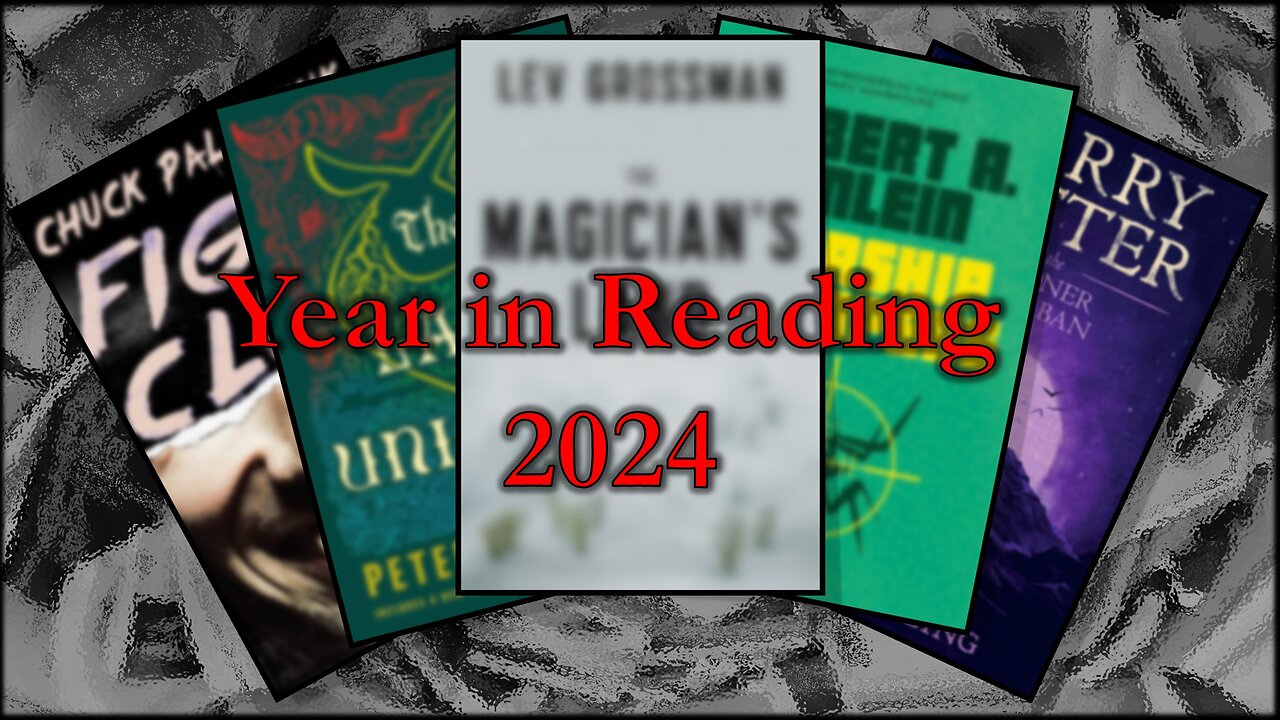
2024 Year in Reading
I go over all the books I read in 2024. I read 86 books (some read twice). So here are 86 mini-reviews.
Join my discord at https://discordapp.com/invite/yHeQK2C.
This video is intended for mature audiences only. That means if you’re under 18, you should probably go watch something else. Like Sesame Street. Or Barney. Or whatever kids watch these days. This live stream contains gaming violence, cursing the games (especially those with frustrating RNG), and dark humor that may offend some viewers. So if you’re easily triggered, squeamish, or have a weak stomach, you might want to look away. Or better yet, grow a pair. You have been warned.
Donation Link: https://buy.stripe.com/dR66r36Mt3nVaLS28c
Buy my novel: https://alexmicelisplayspoemsandprose.wordpress.com/when-the-lights-flicker-out-2/
Transcript (mostly):
1. The Magician’s Land by Lev Grossman. This is the third novel in the Magicians series and I cannot speak highly enough about these novels, including this one. If you’ve not read them, do so. They are amazing.
2. The Hobbit by JRR Tolkien. This was my second read of the Hobbit with a twenty year time difference between the reads. It was the January Alex’s Book Circle pick. I did the Andy Serkis audiobook and loved it. I actually like this book better than the Lord of the Rings trilogy. https://rumble.com/v49nb3b-book-club-live-stream-on-the-hobbit-by-jrr-tolkien.html?e9s=src_v1_ucp
3. The General in His Labyrinth by Gabriel Garcia Marquez. Not as good as The Autumn of the Patriarch or One Hundred Years of Solitude.
4. Thinner by Stephen King. Should have been a short story. There is way too much wasted space tracking down the gypsies or Ginelli explaining what he’s doing. I did the audiobook read by the actor who played Ginelli in the movie adaptation, Joe Mantegna, known for Criminal Minds, and he did a great job.
5. Brave New World by Aldus Huxley. This was my second reading, the first being back in college. It was even better than I remembered and just as terrifying. I chose this for the Alex’s Book Circle for February. https://rumble.com/v4fh0vu-book-club-live-stream-on-brave-new-world-by-aldous-huxley.html?e9s=src_v1_ucp
6. Animal Dreams by Barbara Kingsolver. This was from a Magic Realist book list so the book itself threw me. There’s nothing magic realist about it. Possibly I would have liked it better had I known that.
7. The Eyes of the Dragon by Stephen King. This book is told more like a fairy tale than a modern novel. It’s dark fantasy instead of horror. It’s not bad, but not a favorite of mine.
8. The Wonderful Wizard of Oz by L. Frank Baum. I’d read this back in junior high, I think, and I love the world of Oz and especially the retellings and reimaginings within Oz. Including the novel Wicked. But I’m not interested in Wicked the musical or the movie adaptation of the musical.
10. Frankenstein by Mary Shelley. My second read of this British Gothic lit novel and I hate Viktor more than I remembered I did. He’s not only dumb but also refuses any real accountability for his actions. I chose this for the March Alex’s Book Circle read. https://rumble.com/v4miq8u-book-club-live-stream-on-frankenstein-by-mary-shelley.html?e9s=src_v1_ucp
11. Brida by Paulo Coelho. This book was pretty boring. Nothing really happens by the end. This was my third or fourth Coelho book and it was at this point that I noticed how he uses the novel as a mask to espouse his personal philosophy but can’t plot worth a shit.
12. Theft of Fire by Devon Eriksen. Really enjoyable sci-fi heist novel. Lots of interesting ideas about economy and science in it. Along with an interesting enemies to friends dynamic that definitely shouldn’t have dragged out the will they won’t they until the next book in the series. https://rumble.com/v58n9d1-book-club-live-stream-on-theft-of-fire-by-devon-eriksen.html?e9s=src_v1_ucp
13. The Canterbury Tales by Geoffrey Chaucer. I’d read parts of this during college and my impression then was the high amount of sexual and scatological humor in it. That’s still my impression.
14. The Infinite Plan by Isabel Allende. I disliked how little sympathy Gregory got from both the narrative and the characters despite the many horrific things he suffered all because he was a man. Though the book does a good job at showing an actually complex view of racism and sexism which is nice in comparison to currently published novels.
15. The Marvellous Land of Oz by L. Frank Baum. So hilariously there is a male character who is actually female, but had a spell cast on her by evil adults. Baum starts his tradition in this book of introducing more and more weird things into the land of Oz.
16. And Then She Was Gone by J. Daniel Sawyer. Daniel and I are friends and picked his book for the Alex’s Book Circle and I’m glad I did. This was a really shocking mystery in a way that most mysteries usually aren’t for me. https://rumble.com/v4s4xvh-book-club-live-stream-on-and-then-she-was-gone-by-j.-daniel-sawyer.html?e9s=src_v1_ucp
17. Skeleton Crew by Stephen King. This was a collection of short stories and about when I realized King has an obsession with his characters having sex, despite them being in immediate danger, which is stupid to me. It’s just getting on my nerves at this point.
18. Ozma of Oz by L. Frank Baum. This is the one where the Gnome king has turned several people into objects color coded to match something about them. It also mentions a father that sold his children to the Gnome king as slaves, which is dark as fuck.
19. The Valkyries by Paulo Coelho. This is when I decided to remove all further Coelho from my reading list. Once you’ve read one of his books, you’ve pretty much read them all. They’re new age narcissism dressed up as wisdom.
20. The Prince by Niccolo Machiavelli. How people talk about this book vs actually reading it is kinda contradictory. It’s mostly history. I didn’t like him arguing to disarm the citizenry if the leader came in externally. The last section was the most enjoyable because it had some humorous bits.
21. Chapterhouse Dune by Frank Herbert. It’s obvious from the end of this novel that Herbert planned to write more. I won’t read the novels by his son. Dune books kinda start to fall apart world building wise as we go along, but his insights into politics and governance are still amazing.
22. Crudrat by Gail Carriger. I did the audiobook my friend J. Daniel Sawyer produced, which was a dramatic reading. I mostly like dramatic readings, but not when they put a lot of audio effects in. I need the audio to be really clean for me to comprehend it. I actually don’t remember how this book ends.
23. The Luminescence Manual by Lisabeth Lange. Adam Coleman asked me to do this one for the Alex’s Book Circle book club because it was the first novel the publishing company he started premiered. It was an intriguing premise and very in touch with issues of today, but I wasn’t a fan of the prose style or some of the plot answer reveals. https://rumble.com/v4x8b0q-book-club-live-stream-on-the-luminescence-manual-by-lisabeth-lange.html?e9s=src_v1_ucp
24. In the Time of the Butterflies by Julia Alvarez. This is a fictionalized version of the life of three sisters who were freedom fighters. It definitely makes you feel for the three women who died.
25. Dorothy and the Wizard in Oz by L. Frank Baum. There’s a really interesting cat trial in the novel, mostly from a plot perspective. The idea that the people of Oz would put a cat on trial is totally on brand for an Oz book, but it’s weird in other ways.
26. The Resurrection Junket by J. Daniel Sawyer. I really liked this one. It brought up some interesting science questions I hadn’t considered before and some ethical ones as well.
27. The Road to Oz by L. Frank Baum. It was at this point that I realized that Baum had a thing about heads. Also for some reason, everyone loves Ozma and wants to go to her birthday.
28. The Neon God by Ben D’Alessio. Twice. Ben and I have done some live streams together and I wanted to do one of his novels for Alex’s Book Circle. This one seemed the most interesting of the bunch. I’m so glad I picked it. It’s hilarious. https://rumble.com/v54jmmt-book-club-live-stream-on-the-neon-god-by-ben-dalessio.html?e9s=src_v1_ucp
29. The Emerald City of Oz by L. Frank Baum. This book doesn’t take place in Emerald City, which is annoying. It also has Ozma say that the people of Oz cannot protect themselves from three invading armies using force because that’s wrong and then instead erases all of those combatants’ memories. That’s worse. You see how that’s worse, right?
30. Moll Flanders by Daniel Defoe. This is one of those books that explores a sinful life. They always cover decades of a fictional person’s life and all the terrible mistakes they make. The main character of this novel lies a lot. She marries way too many men and at one point I actually yelled, “Stop getting married,” because all her marriages go wrong, like the one to her brother!
31. The Two Towers by J.R.R. Tolkien. I hadn’t read it before and did the Andy Serkis audiobook and he does such a good job. He basically imitates the actors from the movies. I don’t like how the book is structured though. Because this is where the fellowship breaks up and instead of a chronological telling of events wherein we jump between sets of people from the fellowship, instead it follows one set of people from beginning to end of their chronology and then jumps back in time to follow the next set of people.
32. The Moor’s Last Sigh by Salman Rushdie. This book has some random crass jokes that were both shocking and hilarious. Rushdie’s ability to blend comedy into these serious books seems mostly overlooked when people talk about his work.
33. Smoke and Mirrors by Neil Gaiman. I didn’t really like this collection. It’s a bit sex obsessed and the title of the collection seems unmoored from the stories themselves.
34. Ender’s Game by Orson Scott Card. Whenever people talk about this book they only talk about Ender, completely leaving out his siblings, who are also geniuses and greatly affect humanity at the same time Ender does. The whole thing reeks of child abuse, but that didn’t stop me from thinking it’s an amazing novel. In fact, I think that is pivotal to how good it is.
35. The Patchwork Girl of Oz by L. Frank Baum. At this point, I’m liking these books less and less. There are so many bad lessons here for children. I would say stop reading them to kids before The Emerald City of Oz.
36. It by Stephen King. The child orgy is completely unnecessary, both narratively and thematically. Could have been, should have been cut. Would be a much better book without it. There’s things about Pennywise that are not covered in either adaptation that are so cool though.
37. Fight Club by Chuck Palahniuk. I read this one twice in prep for the Alex’s Book Circle book club. Out of all the first reads for the year for the book club and maybe for this entire list for first reads, this one was my favorite. The movie is surprisingly close to the novel. An absolute must read. https://rumble.com/v5c5ssy-book-club-live-stream-on-fight-club-by-chuck-palahniuk.html?e9s=src_v1_ucp
38. Le Morte d’Arthur by Thomas Mallory. This book is so long, and Mallory kinda confuses people and plots. Way more women trying to rape men than I would have thought.
39. Misery by Stephen King. This is one of his better novels, contrary to what people told me. Someone once said it was about writer’s block, but that wasn’t my impression. It’s more about the horrific lengths some people will go to force a parasocial relationship into their fantasy of a close relationship. The ending was amazing and I definitely felt more about this novel being a writer myself.
40. Daughter of Fortune by Isabel Allende. This one was really good. Allende doesn’t ever get too close to her characters, but despite that I really liked Dao and Eliza.
41. Portrait in Sepia by Isabel Allende. This is actually a sequel to Daughter of Fortune, mostly following Dao and Eliza’s granddaughter. I was very said that Dao was right about giving their daughter his first wife’s name.
42. The Return of the King by J.R.R. Tolkien. The Lord of the Rings trilogy is interesting, but I find I’m not a fan of the execution. The organization of the narrative annoys me and is disruptive to the flow of story. Frodo’s decision not to kill Saruman and the latter’s subsequent death were just lazy poetic justice. I do not find anything mature about not killing a man who caused the deaths of hundreds if not thousands of others.
43. Starship Troopers by Robert A. Heinlein. Another one I didn’t actually like. It’s not a novel. It’s an essay disguised as narrative but narrative actually requires plot, which this book doesn’t have. I understand that Heinlein may have felt forced to claim this was a novel to be able to publish it, but I’d rather he hadn’t. It’s much worse than his The Moon Is a Harsh Mistress and John Steakley’s Armor.
44. Gulliver’s Travels by Jonathan Swift. As much as I love Swift, this book is too related to the politics of Swift’s time to be an enjoyable read. One has to know about the intricacies of British court factions and law to understand all of it. So it is too weird in its world-building and meanders too much to be something a reader can enjoy on its own merits.
45. Lancaster and York: The War of the Roses by Alison Weir. Weir is basically the best Tudor historian of our time. So if it has her name and you’re interested in the subject, read it. The War of the Roses is one of the most fictionalized monarchical struggles to grace page or screen, with even The Game of Thrones books taking inspiration from it.
46. City of the Beasts by Isabel Allende. Very much YA and just weird. It’s the first of a trilogy and I didn’t bother reading the other two if that tells you anything.
47. The Dark Half by Stephen King. I liked this novel and there’s a lot here to discuss, but directly following Misery, it’s not as well received as it could be. Too many fictionalized writers in a row.
48. Abaddon’s Gate by James S.A. Corey. This is the third novel in The Expanse series, but it turned me off to continuing the series. They just keep adding more perspectives that I don’t care about. One of them added in this book, Ana, feels too unrealistic. Overly crafted.
49. The Wars of the Roses: The Fall of the Plantagenets and the Rise of the Tudors by Dan Jones. Jones is a good historian, but he doesn’t read as detailed or as engaging as Weir.
50. The Last Unicorn by Peter S. Beagle. This is my second favorite new read for the Alex’s Book Circle book club. The prose alone is worth the time. The story is so intense and beautiful. I read it twice. https://rumble.com/v5gprzx-book-club-live-stream-on-the-last-unicorn-by-peter-s.-beagle.html?e9s=src_v1_ucp
51. Anansi Boys by Neil Gaiman. Years ago I had listened to the Channel 4 radio play adaptation of this novel, so while I knew the story, this was a first read for me. One of his better novels. Everything comes together in such a cool way at the end.
52. The Tudors by Jane Bingham. This is a very short run through of Tudor history. Good if you just want the basics.
53. Les Liaisons Dangereuses by Pierre Choderlos de Laclos. This is another immorality story, wherein no one is likable. It’s told entirely through letters. I question that the Vicomte de Valmont ever actually loved Madame de Tourvel, since he deliberately hurt her and had sex with another woman after he claimed he loved her, or had any real moral redemption. I don’t believe his final act of destroying Marquise de Merteuil was motivated by ethical reasons so much as more revenge. The novel is sorta soap opera entertainment in fancy clothes.
54. Four Past Midnight by Stephen King. There are some good stories in this collection. The library one is very dark and maybe too graphic. Again, King shows his weird fixation on rape, only this time with a twist. Also I hate in that story that the woman decided to stop dating him because he drank a glass of wine at dinner on one of their dates and didn’t explain why. It’s unreasonable to expect everyone else to follow your rules, especially when you don’t explain them.
55. Dracula by Brom Stoker. This is the second time I’ve read this novel and it was for the Alex’s Book Circle book club. I both like and dislike this novel. It’s approach to good and evil is a little too black and white. But at the same time, I’m frustrated and always have been by the discourse around Lucy saying she’s a slut. Women who die virgins are not sluts. https://rumble.com/v5k8v51-book-club-live-stream-on-dracula-by-bram-stoker.html?e9s=src_v1_ucp
56. The Once and Future King by T.H. White. I wouldn’t call this book literature, which is why the way people talk about it confuses me. It is for young boys, full of anachronisms, and mostly just fun. I hate it though when Merlin says animals don’t have war, especially given that he is talking about ants when he says it.
57. The Sparrow by Mary Doria Russell. Hardly sci-fi. More interested in being antithesist than telling an interesting story. Russell, like some other modern writers, shies away from saying things outright, especially as it comes to violence, of which there is a lot in this book, making for a little bit of a confusing read. Not reading the follow ups in the series.
58. The Lost Tudor Princess: A Life of Margaret Douglas, Countess of Lennox by Alison Weir. This is a good deep dive into Margaret Douglas and her political machinations. Weir delivers again.
59. American Gods by Neil Gaiman. Very enjoyable. Not as good as Anansi Boys, though related to it as Anansi is in it. Great reveals in the final part that are not obvious or contrived.
60. Henry VIII: The Charismatic King who Reforged a Nation by Kathy Elgin. Pretty boring. Not all that standout as a history book.
61. Mansfield Park by Jane Austen. So far this is my least favorite Austen book. Fanny is downright annoying and unlikable. Pretty much everyone is unlikable. Including the male lead. And that’s saying a lot since I like Darcy in Pride and Prejudice.
62. The Waste Lands by Stephen King. I wasn’t expecting this book to be this exciting. The Waste Lands as a title doesn’t really suggest this much action, but it was very enjoyable.
63. Harry Potter and the Sorcerer’s Stone by JK Rowling. I started rereading these because I started playing Hogwarts Legacy and I’m glad I did, because that game takes a lot from the novels. I did the Stephen Fry audiobook and he does a great job.
64. The Man in the High Castle by Philip K. Dick. I read this twice for the Alex’s Book Circle book club. It’s the second Dick novel I’ve read, the first being Radio Free Albemuth. I didn’t like it much. It’s actually more about numerology and using it to predict events. The best part is when someone talks about fake antiques versus real ones with historical importance, which is something I always found dumb about antiques. https://rumble.com/v5s86dz-book-club-live-stream-on-the-man-in-the-high-castle-by-philip-k.-dick.html?e9s=src_v1_ucp
65. Harry Potter and the Chamber of Secrets by JK Rowling. Turns out while Fry performs each novel well, his performance choices do not remain constant between different books. Chamber was for a long time my least favorite of the novels, but I’m not sure what order I would put them in now.
66. A Wizard of Earthsea by Ursula K. Le Guin. This book was so boring. Le Guin never gets really close and it’s too long to be that distant. I’m not going to read any of the others.
67. Harry Potter and the Prisoner of Azkaban. This is one of my favorites because for once the bad guy is the bad guy. Instead, it feels like it teaches a lesson in the appearance of events and rumor. This time reading it, I was so sad.
68. Earth Abides by George R. Stewart. This is a very different post-apocalypse narrative, in that the main character builds a new life and there is not real antagonist, except the march of time. Stewart uses language to describe a character as black that no one does anymore. It’s not mean language or anything. It’s just a reference most readers won’t get. I hated that the main character wished the state still existed and could take over leadership. What a pussy.
69. Shalimar the Clown by Salman Rushdie. None of the characters is likable. And this one isn’t as funny as his other novels. It’s a rough read.
70. Queen of Scots: The True Life of Mary Stuart by John Guy. A decent walkthrough of Mary’s life.
71. The Crystal Shard by R.A. Salvatore. I mostly liked this novel. I felt some the names were crazy, like the one for the dragon. It sounded like a sneeze. The best part were the characters, and they gave me a few laughs.
72. Harry Potter and the Goblet of Fire by JK Rowling. We really learn how great of a person Harry is. He’s so fair, which is even more important than how brave he is.
73. Needful Things by Stephen King. I loved this one until the ending, which was just weird. Not as interesting as everything that led up to it.
74. Altered Carbon by Richard K. Morgan. The world that Morgan builds here is so cool and so fucked up. But I actually didn’t like this novel as much as I liked the first season of the show. The mystery is better handled in the show than in the book.
75. Emma by Jane Austen. Emma is likable but flawed and learns a lesson by the end. The novel is funny but not as funny as Pride and Prejudice. I think Pride and Prejudice is her most talked about novel because it is her best one.
76. Harry Potter and the Order of the Phoenix by JK Rowling. We get a great examination of Harry’s big flaw, his anger, in this installment. It’s a make or break part of the series for him as a character.
77. Dragonflight by Anne McCaffrey. Loved this book. Will continue reading Dragon Riders of Pern books. Interesting and engaging characters, world, and problems. I had thought it was fantasy, but it is more science-fantasy.
78. Murder on the Orient Express by Agatha Christie. Read it twice for the Alex’s Book Circle book club. I chose it because I wanted a wintery book, and the whole investigation happens because a snowdrift stops the train. What horrific luck these people have. There’s like no denouement to this novel. It just ends. I did the Dan Stevens audiobook not realizing that’s who was reading it until I started it and got excited. He does such different and realistic voices for the various characters. https://rumble.com/v61cbqt-book-club-live-stream-on-murder-on-the-orient-express-by-agatha-christie.html?e9s=src_v1_ucp
79. Harry Potter and the Half-Blood Prince by JK Rowling. I haven’t read this one as many times as the previous ones, so it was good to reread it. I feel so sorry for Malfoy in this one. This installment is to get Harry ready for standing without a mentor in the future.
80. Elizabeth I: Legendary Queen of England by Michael W. Simmons. I believe it was this one that quoted Alison Weir more than it seemed to quote original sources. I could be mixing that up with another of the basic history books that didn’t really standout.
81. Gerald’s Game by Stephen King. This shows more skill than most novelists have. Somehow King makes a woman trapped in a bed by herself riveting. It’s downright impressive. However, the ending is terrible. Just a giant info dump on the reader. And also a lot of misandry.
82. Mistress of Magic by Marion Zimmer Bradley. I’m not sure if I’m going to read more of the Mists of Avalon. I usually like retellings from other perspectives, but this one rankled. It’s super pro-woman and reminds me too much of Coelho’s work, new age mysticism disguised as old wisdom.
83. Fragile Things by Neil Gaiman. Very hit and miss collection of short stories. When there was supposed to be a Sherlock Holmes Lovecraft story I got excited, but it was a disappointment.
84. Dolores Claiborne by Stephen King. It’s a verbal telling by the titular character about killing her husband and taking care of this old rich lady. It’s related to Gerald’s Game, sometimes in dumb ways. I like the voice of Dolores but she could be very misandrist and there was a lot of that throughout the novel. Because she’s the only voice we ever actually hear, there’s no counter to that perspective.
85. The Forever War by Joe Haldeman. It seems like a fictionalized exploration of Halderman’s military experience. Parts of it almost seem pro-communist. I liked what happened at the end.
86. A Clockwork Orange by Anthony Burgess. This is my first read of this novel, done for the Alex’s Book Circle book club, and I’ll be reading it again in 2025 because I started it again on Jan 1. The language of this book is so hard to parse. It often confuses the action with all its slang. I don’t quite buy the ending. https://rumble.com/v6ago4v-book-club-live-stream-on-a-clockwork-orange-by-anthony-burgess.html?e9s=src_v1_ucp
-
 2:41:11
2:41:11
Canal Paulo Figueiredo
2 days agoPedro Valente Debunks The Myths of Jiu-Jitsu History
75K10 -
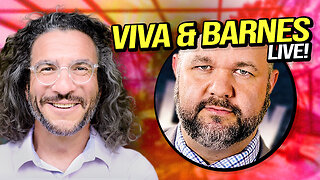 2:01:46
2:01:46
vivafrei
14 hours agoEp. 254: China to Pay $24 BILLION? Who Owns Embryos? Tulsi was RIGHT on Syria! Prorogation & MORE!
180K165 -
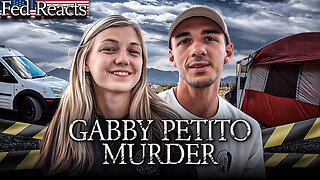 3:40:55
3:40:55
MyronGainesX
23 hours ago $24.65 earnedFormer Fed Explains Gabby Petito's Murder
106K40 -
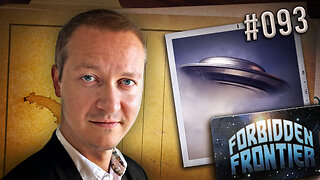 2:18:05
2:18:05
Nerdrotic
14 hours ago $10.30 earnedInvestigations into the Unknown with Micah Hanks | Forbidden Frontier #093
94.8K13 -
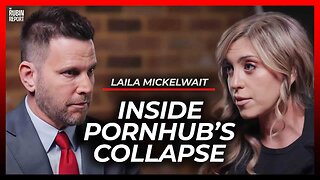 18:54
18:54
The Rubin Report
18 hours agoHow One Woman Outsmarted Pornhub & Exposed Its Dark Secrets | Laila Mickelwait
190K142 -
 LIVE
LIVE
Major League Fishing
5 days agoLIVE! - Bass Pro Tour: Stage 3 - Day 4
574 watching -
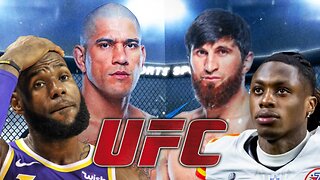 1:05:28
1:05:28
Sports Wars
21 hours agoLebron GOES OFF Over Bronny Hate, Pereira LOSES Belt To Ankalaev At UFC 313, Xavier Worthy Arrested
120K19 -
 10:27
10:27
Tactical Advisor
1 day agoDMR or SPR for Civilian Use?
112K6 -
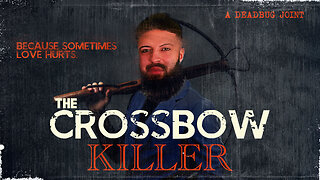 8:21
8:21
DEADBUGsays
1 day agoThe Crossbow Killer
105K22 -
 8:40
8:40
Tundra Tactical
1 day ago $13.94 earnedThe Executive Order Wishlist.
107K7